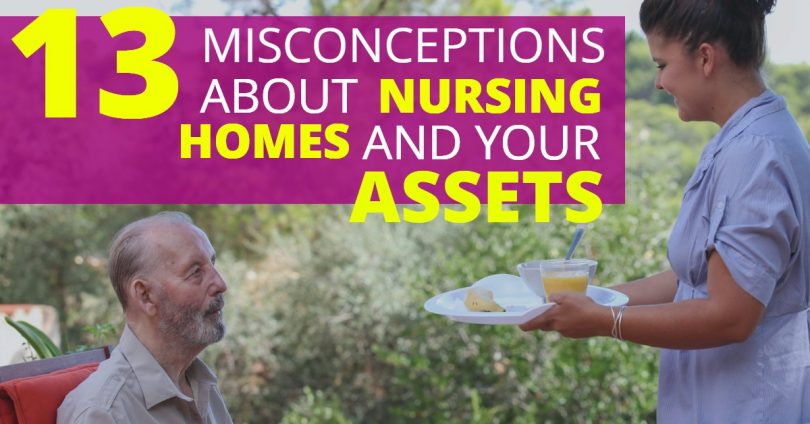Nursing homes are often misunderstood, but it’s important to understand the facts when considering care for yourself or a loved one. According to recent research, there are multiple misconceptions about nursing homes and the impact they can have on an individual’s assets. Educating oneself on these matters can be extremely beneficial, as it will ensure you make an informed decision about your health and financial situation.
Misconception No. 1 – Putting Assets In Joint Names With Children Does Not Guarantee Exemption From Nursing Home Costs
Creating joint assets with your children, such as putting them in joint names, does not automatically exempt them from Medicaid consideration for nursing home purposes. In fact, you are still considered the owner of these assets and could be disqualified from receiving Medicaid benefits, depending on the details of the asset creation. To ensure that your assets stay exempt from such consideration, it’s important to have an understanding of state Medicaid laws and regulations and work with an experienced professional who can help you navigate them.
Misconception No. 2 – I Can’t Transfer Assets Just Before Entering A Nursing Home
The five-year rule is a look-back regulation that applies to Medicaid applicants, not individuals entering a nursing home. When applying for Medicaid, there is a question on the application asking if any assets have been transferred in the past five years. If so, this could lead to ineligibility for Medicaid for a specified period of time, which can range from longer than five years to shorter than five years. Therefore, it is possible to transfer assets prior to entering a nursing home, even if it is within the five year period prior to applying for Medicaid.
Misconception No. 3 – You Can’t Transfer Assets After You Are Already In A Nursing Home
The Medicaid look-back period requires individuals to report any financial transfers made in the five years preceding their application, regardless of whether they have already entered a nursing home. Meanwhile, the penalty period is calculated by dividing the amount of money transferred by the State Divisor Rate, which for Colorado in 2016 was $7,563.00 – with its commencement time varying depending on certain rules and regulations.
Misconception No. 4 – Applying for Medicaid After Making A Gift May Be Restricted Within A Five-Year Timeframe
Making gifts to other parties does not necessarily mean that Medicaid benefits cannot be applied for within a five-year period. A penalty may be imposed in the form of a number of months of ineligibility if assets have been transferred, which is calculated by dividing the value of the assets given away by the State Medicaid Divisor. This penalty does not apply to individuals who are transferring assets between spouses.
Misconception No. 5 – I Can Give Away $17,000 Per Person Per Year Without Any Penalty
Gifting to an individual or individuals can have consequences under Medicaid rules, even if the gifts are below the Federal annual gift tax limit of $17,000 per person. All divestments in the form of a gift or transfer will result in a penalty period during which the individual is ineligible for Medicaid benefits. To limit any potential penalty it is advisable to consult with a lawyer or financial advisor before making any type of gift or transfer that could affect Medicaid eligibility.
Please note that $17,000 was the correct amount in 2023
Misconception No. 6 – If My Spouse Or I Go Into A Nursing Home, The State Will Take My Assets
Generally speaking, in the United States, it is illegal for public assistance to be used to pay for long-term care until all private resources of the person who needs care have been exhausted. This means that a person’s income and assets must first be used to pay for care before public assistance can be sought. Individuals receiving Medicaid benefits are also subject to asset recovery laws. If an individual passes away while receiving Medicaid benefits, some of their remaining assets may be recovered by the state as reimbursement for the benefits they received. Therefore, even though individuals receiving Medicaid may not necessarily have all of their assets taken away upon entering a nursing home, some states do require reimbursement of certain types of long-term care expenses from individuals who pass away with remaining assets.
Misconception No. 7 – If My Spouse Or I Go Into A Nursing Home, I Will Lose My Home
Owning and using a home in the correct manner during one’s lifetime can exempt it from consideration as an asset for nursing home expenses. Other exempt assets include a single automobile, pre-paid funeral arrangements, and certain life insurance policies. After death, a properly-titled home is not subject to probate nor does it become available to be used as part of the state’s Medicaid estate recovery program, which is utilized to pay back the state for any Medicaid benefits received.
Misconception No. 8 – By Purchasing a Medicaid-friendly Annuity I Can Protect My Assets
Once a popular Medicaid pre-planning tool, annuities have lost much of their effectiveness due to changes in Federal and State Medicaid laws. Most annuities marketed as “Medicaid-friendly” are simply deferred annuities that can be converted into monthly Medicaid-qualifying payments over the owner’s lifetime. While these payments are considered income and therefore not countable assets for Medicaid purposes, the options for using these annuities to qualify for Medicaid are limited. Specifically, after qualification, the income must be used to pay for nursing home expenses and the death benefit must be used to pay the State back for any expenses incurred. Moreover, cashing in these annuities can result in steep surrender charge penalties, which may be as high as 50 percent. As a result, these annuities may limit asset protection options for those in nursing homes. However, certain Medicaid-compliant annuities purchased after entering a nursing home as part of a comprehensive asset protection plan can still be effective planning tools.
Misconception No. 9 – There Is A Slim Chance That I will Go into a Nursing Home
Senior citizens have a significant chance of spending long-term stints in a nursing home; according to New England Journal of Medicine findings, an estimated 43% of people aged 65 and above will spend some time in such facilities during their lifetimes. Of those individuals, the majority (55%) will remain for one year or more, while around 21% will be living in a nursing home for five years or longer. Consequently, seniors must prepare themselves for the possibility of spending at least one year in a nursing home.
Misconception No. 10 – There is no need for Long-term Care Insurance If I Apply For Medicaid
Long-term care insurance policies are becoming increasingly popular as they offer a much more flexible way of paying for long-term care expenses compared to traditional Medicaid coverage, which is usually limited to specific nursing homes. These modern policies are designed to cover costs associated with assistance at home, adult foster care homes, assisted living facilities and nursing homes, allowing people to receive the help they need while remaining in their preferred environment.
Misconception No. 11 – If I Am Already In A Nursing Home, It Is Too Late To Protect My Assets
It is possible to protect assets even after being in a nursing home for a prolonged period of time. Even after years of paying for nursing home expenses out of pocket. In cases where one spouse is in a nursing home while the other lives at home, it is usually possible to protect nearly all of the assets for the stay-at-home spouse. Even if both spouses are in a nursing home or if an unmarried individual is in a nursing home, it is still possible to protect a significant portion of the assets.
However, Medicaid and asset protection planning can be complex and should not be attempted without the guidance of an experienced elder law specialist. Attempting to navigate these issues alone can result in Medicaid ineligibility for months and additional costs and expenses. It is important to consult with a knowledgeable professional who can advise you properly.
Misconception No. 12 – I Was Advised To Exhaust My Assets In Order To Qualify For Assistance
For married couples, it is almost always unnecessary to spend down; any advice suggesting that this is their only option should be rejected. The fact is, there are numerous other avenues and strategies that can be pursued to take advantage of available benefits and resources without having to deplete one’s savings or assets. Consulting with an experienced Elder Law Attorney can help provide comprehensive information about the best options available for each unique situation.
Misconception No. 13 – Not Reporting Income From Assets On Tax Returns Does Not Exempt Them From Disclosure To Medicaid
It is a criminal offense to fail to fully disclose all assets, including annuities and EE bonds, to Medicaid even if they do not produce current income. Concealing these assets can result in imprisonment. It is essential for individuals to ensure total transparency when providing information to Medicaid so that any legal consequences are avoided.



